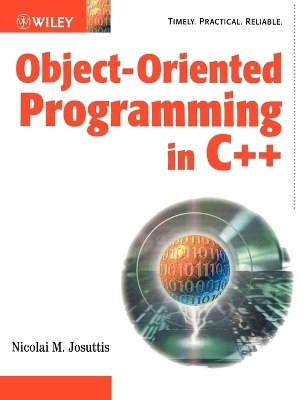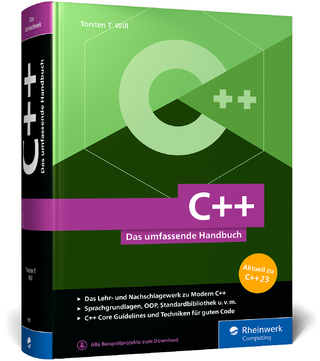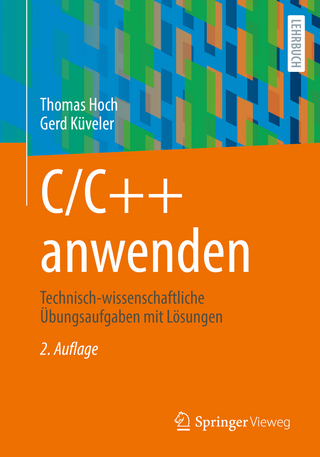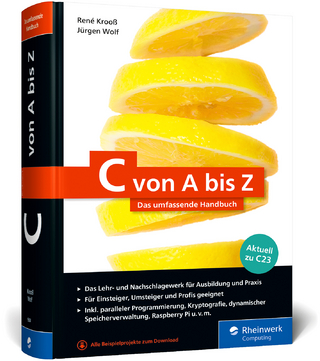
Object-Oriented Programming in C++
John Wiley & Sons Inc (Verlag)
978-0-470-84399-4 (ISBN)
This step-by-step tutorial teaches you all language features and explains their practical usage. Josuttis goes well beyond the basics, demonstrating how to combine templates with object-oriented programming to produce the power of modern C++ development for high performance programs.
Comprehensive, detailed, readable, practical and up-to-date
Teaches you how to get the power from C++, using the current ANSI language standard and programming model
Specific hints from the author help to switch between and compare C and Java
Companion Web Site provides further information including source code for the examples in the book
Nicolai M. Josuttis is an independent system architect, technical manager, author, consultant, and trainer who has been active in C++ standardization for over 20 years. He designs mid-sized and large software systems for the telecommunications, traffic, finance, and manufacturing industries. A former member of the C++ Standard Committee library working group, he is highly regarded and well known in the programming community for his authoritative books.
Preface. 1. About this Book.
Why Did Write this Book?
Prerequisites.
Organization of the Book.
How Should You Read this Book?
Example Code and Additional Informations.
Feedback.
2. Introduction: C++ and Object-Oriented Programming.
The C++ Language.
C++ as an Object-Oriented Programming Language.
Other Concepts of C++.
Teminology.
3. Basic Concepts of C++ Programs.
The First Program.
Types, Operators, and Control Constructs.
Functions and Modules.
Strings.
Collections.
Exception Handling.
Pointers, Arrays, and C-Strings.
Memory Management Using new and delete.
Communication with the Outside World.
4. Class Programming.
The First Class: Fraction.
Operators for Classes.
Running Time and Code Optimization.
References and Constants.
Input and Output Using Streams.
Friends and Other Types.
Exception Handling for Classes.
5. Inheritance and Polymorphism. Virtual Functions.
Polymorphism.
Multiple Inheritance.
Design Pitfalls with Inheritance.
6. Dynamic and Static Members.
Dynamic Members.
Other Aspects of Dynamic Members.
Inheritance of Classes with Dynamic Members.
Classes Containing Classes.
Static Members and Auxiliary Types.
7. Templates.
Why Templates?
Function Templates.
Class Templates.
Non-Type Template Parameters.
Additional Aspects of Templates.
Templates in Practice.
8. The Standard I/O Library in Detail.
The Standard Stream Classes.
File Access.
Stream Classes for Strings.
9. Other Language Features and Details.
Additional Details of the Standard Library.
Defining Special Operators.
Additional Aspects of new and delete.
Function Pointers and Member Pointers.
Combining C++ with C Code.
Additional Keywords.
10. Summary.
Hierarchy of C++ Operators.
Class-Specific Properties of Operations.
Rules for Automatic Type Conversion.
Useful Programming Guidelines and Conventions.
Bibliography.
Glossary.
Index.
| Erscheint lt. Verlag | 5.12.2002 |
|---|---|
| Verlagsort | New York |
| Sprache | englisch |
| Maße | 190 x 236 mm |
| Gewicht | 1191 g |
| Themenwelt | Informatik ► Programmiersprachen / -werkzeuge ► C / C++ |
| Informatik ► Software Entwicklung ► Objektorientierung | |
| ISBN-10 | 0-470-84399-3 / 0470843993 |
| ISBN-13 | 978-0-470-84399-4 / 9780470843994 |
| Zustand | Neuware |
| Haben Sie eine Frage zum Produkt? |
aus dem Bereich


